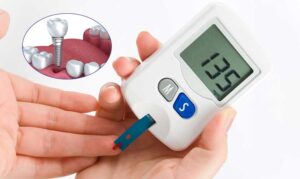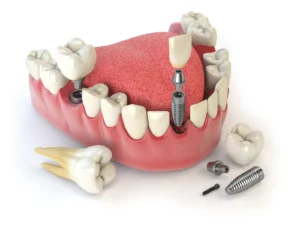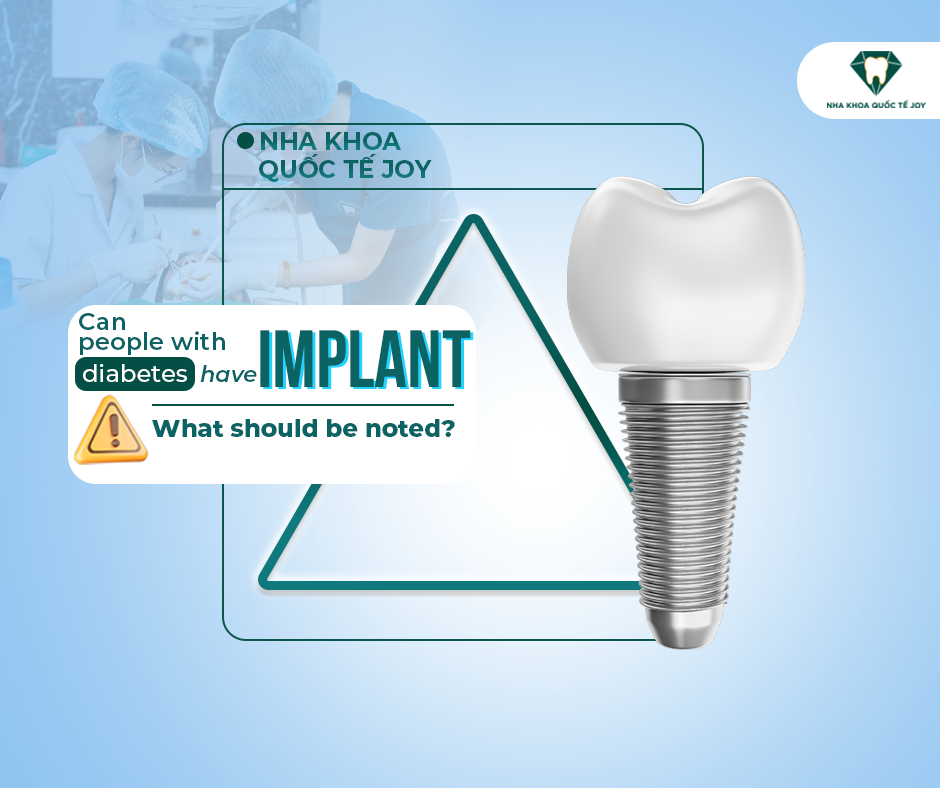” Can people with diabetes have implants ? “—this is a common concern among many patients who are seeking solutions for missing teeth. Due to the potential impact of diabetes on surgical outcomes and wound healing, individuals must proceed with caution. Today, Joy International Dental Clinic is here to provide you with detailed and reliable information about this important topic.
1. Overview of Diabetes

Diabetes, also known medically as diabetes mellitus, is a chronic health condition characterized by the body’s inability to regulate blood sugar levels effectively. As a result, the amount of glucose in the blood remains higher than normal, which can lead to a wide range of health issues over time if left uncontrolled. This is not merely a single illness—it affects various organs and bodily systems, posing serious complications if not managed properly.
Our bodies rely on insulin, a hormone produced by the pancreas, to transport glucose from the bloodstream into cells, where it is used for energy. In individuals with diabetes, this process is disrupted. The body either does not produce enough insulin or cannot use it effectively, leading to persistent high blood sugar levels. Over time, this can cause issues such as high blood pressure and significantly compromise one’s overall health.
2. Can People with Diabetes Get Dental Implants?

Many diabetic patients wonder if they are eligible for dental implants, and the good news is—yes, they can, provided their blood sugar levels are well controlled. With proper medical supervision and strict adherence to the dentist’s recommendations, dental implant procedures can be performed safely.
However, it’s important to note that diabetes can impair the healing process. This is due to weakened immunity, reduced blood circulation, and an increased risk of infections. These factors make the procedure more complex and require extra care.
If your HbA1c (a measure of average blood sugar levels over the past 2–3 months) is under 7%, and your blood sugar is stable with no serious complications such as infections or osteoporosis, then implant placement is considered safe.
Prior to the procedure, your dentist will conduct a series of examinations to assess your overall oral and general health. This pre-operative evaluation ensures the highest chances of a successful and smooth surgical outcome. After the implant is placed, meticulous post-operative care will be necessary to support proper healing and integration of the implant with the jawbone.
3. Essential Tests for Diabetic Patients Before Dental Implant Surgery
3.1 Can people with diabetes have implants? You need a blood test.

Blood tests are critical in assessing whether a diabetic patient is suitable for implant surgery. These tests help determine the level of blood sugar control and evaluate other vital indicators, including white blood cell count, platelet count, and clotting function. These factors are essential to ensure the body can recover effectively from surgery.
3.2 Screening for Other Chronic Conditions
Diabetic patients often have other underlying chronic conditions such as high blood pressure, cardiovascular disease, bleeding disorders, or compromised immune systems. These comorbidities can affect the success of the implant procedure and the osseointegration process (how well the implant fuses with the jawbone). Therefore, a thorough general health screening will be conducted to determine whether the patient is fit for implant surgery.
3.3 Oral Health Evaluation

The condition of your mouth plays a significant role in determining the feasibility of dental implant treatment. If you suffer from periodontal disease, gum inflammation, or existing oral infections, these issues must be treated before proceeding with the implant. Addressing these problems reduces the risk of post-surgical complications and creates an optimal environment for the implant to integrate successfully.
3.4 Bone Density and Stability Check
The success of dental implant surgery heavily depends on the quality and density of the jawbone. Your dentist will use imaging techniques such as X-rays or Cone Beam CT scans to assess whether your bone is thick and strong enough to support the implant. If there is significant bone loss, you may require a bone grafting procedure before implant placement can occur.
4. Important Considerations for Diabetic Patients Undergoing Implant Surgery
4.1 Pre-Operative Precautions
Before deciding to undergo implant surgery, diabetic patients must ensure both their general health and blood sugar levels are well managed. It is essential to maintain stable blood sugar levels, with the HbA1c below 7%, to minimize the risks of infection and poor wound healing.
Furthermore, patients should be transparent with their dentist regarding their complete medical history. This allows the dentist to design a customized treatment plan tailored to the individual’s condition.
Evaluating and treating any existing oral health issues is also crucial. Conditions like gum disease can interfere with implant success and should be addressed beforehand.
4.2 Post-Operative Care

After the implant is placed, the recovery phase is crucial to the long-term success of the treatment. Patients must follow all post-operative instructions closely, including taking prescribed medications to prevent infection and control pain.
During the initial healing period, it’s important to avoid hard or excessively hot foods. Instead, opt for soft, easily chewable foods to minimize pressure on the surgical site.
Proper oral hygiene is another key factor. Use saline solutions or antiseptic mouthwash as recommended by your dentist to keep the area clean and prevent infections. If you experience unusual symptoms such as prolonged swelling, excessive bleeding, or a loose implant, seek professional help immediately.
Conclusion
In conclusion, diabetic patients can absolutely benefit from dental implants, as long as their condition is well-controlled and they receive care from a trusted and experienced dental provider. At Joy International Dental Clinic, we are committed to delivering safe and long-lasting implant solutions that help restore your confidence and bring back your healthy smile.
Don’t let diabetes stop you from enjoying a full set of teeth—contact us today for a detailed consultation and let us guide you every step of the way on your implant journey.






